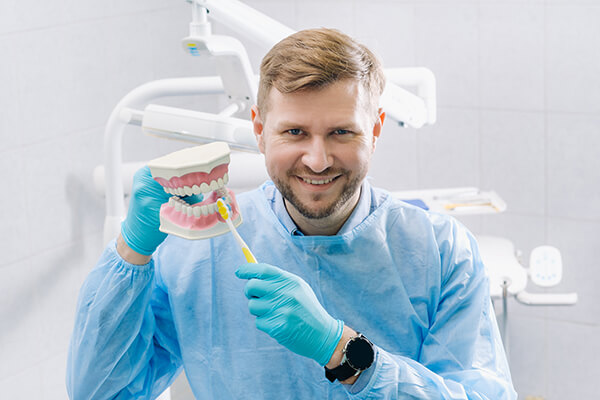Meet Your Pleasant Area Dentist Eugene OR and Their Providers
Meet Your Pleasant Area Dentist Eugene OR and Their Providers
Blog Article
A Guide to Typical Dental Conditions That Call for a Dental professional's Care
Recognizing the range of oral problems that demand specialist care is critical for keeping ideal dental health. Toothaches, for example, can be symptomatic of extreme issues such as dental caries, split teeth, or abscesses, each needing particular interventions like dental fillings or root canals. Gum tissue illness, from the beginning of gingivitis to more severe periodontitis, highlights the value of routine dental exams and cleanings. Additionally, impacted knowledge teeth and jaw conditions can introduce substantial pain and problems. Ensuring prompt sees to the dental expert can minimize these problems effectively, yet what exactly are the therapies and signs entailed?
Toothaches
Toothaches are a common dental condition that can vary from moderate discomfort to serious pain, commonly indicating an underlying concern that requires expert interest. This pain can come from a range of sources, consisting of oral cavities, cracked or fractured teeth, and dental abscesses. Each of these conditions positions substantial threats if left neglected, possibly bring about more serious problems.
Dental dental caries, additionally recognized as decays, are triggered by the build-up of plaque that deteriorates tooth enamel, leading to openings or pits in the impacted teeth. Fractured or fractured teeth, on the other hand, might arise from trauma, grinding, or biting right into difficult items. These structural damages can expose the delicate internal layers of the tooth, triggering sharp discomfort and boosting the danger of infection. Abscesses hurt infections at the origin of a tooth or between the gum and a tooth, typically arising from serious degeneration or unattended dental caries.
Reliable therapy of toothaches includes dealing with the origin. This might include dental fillings for dental caries, crowns for split teeth, or root canals and anti-biotics for abscesses. Early intervention by a dental professional can protect against additional degeneration and alleviate discomfort, guaranteeing optimum dental health.
Gum Tissue Condition

The key source of periodontal illness is microbial plaque, a sticky, anemic film that constantly creates on teeth. Poor oral hygiene, smoking cigarettes, hereditary proneness, and specific clinical conditions, such as diabetes, can exacerbate the danger of developing gum tissue illness. Regular oral check-ups are critical for very early detection and monitoring of this condition.
Therapy for gum tissue condition ranges from professional oral cleansing and scaling to advanced procedures like origin planing and periodontal surgical treatment, depending on the extent. Preserving excellent dental hygiene techniques, including cleaning two times daily, flossing, and utilizing an antibacterial mouthwash, can dramatically decrease the threat of gum condition and advertise much healthier gums.
Tooth Cavities
Dental caries, also understood as tooth decays, are an usual oral condition defined by the devastation of tooth enamel due to acid-producing germs in the mouth. These microorganisms thrive on sugars and starches from food and beverages, creating acids that progressively erode the enamel, leading to cavity formation.
Early-stage dental caries might not reveal signs and symptoms, however as they advance, they can create toothache, level of sensitivity to warm or cool, visible holes or pits in the teeth, and staining. If left unattended, cavities can permeate deeper layers of the tooth, possibly leading to extreme read what he said discomfort, infection, and also missing teeth.
Preventing tooth cavities entails a combination of good oral health methods and nutritional practices. Normal brushing with fluoride toothpaste, flossing, and routine dental examinations are crucial. Dental professionals may also recommend added safety nets, such as fluoride treatments and dental sealants, to protect teeth from anchor decay.
Small cavities can be addressed with oral fillings, which bring back the tooth's structure. Extra sophisticated situations may call for crowns or even origin canal treatment if the decay has actually reached the tooth's pulp.
Impacted Knowledge Teeth
Influenced knowledge teeth are a common oral issue that takes place when the third molars, generally referred to as knowledge teeth, fall short to completely arise or line up properly within the mouth. This problem frequently arises from not enough area in the jaw or an unusual development angle of the teeth. Impacted knowledge teeth can lead to a range of problems, consisting of damages, infection, and discomfort to adjacent teeth.
When wisdom teeth end up being influenced, they are frequently partly appeared or remain completely under the gum line. This partial eruption can develop a pathway for bacteria to go into the gum tissues, leading to infections that materialize as swelling, discomfort, and also high temperature (dentists eugene). In addition, impacted wisdom teeth can put in stress on bordering teeth, potentially triggering crowding or moving
A thorough oral exam, normally involving X-rays, is necessary for identifying impacted wisdom teeth. Therapy often involves surgical extraction, carried out by a dental doctor. The treatment intends to relieve discomfort and avoid more complications, such as cysts or damages to bordering bone frameworks. Post-operative treatment is essential to guarantee appropriate healing and reduce the risk of infection. Regular oral examinations are recommended to keep an eye on the condition and keep dental health and wellness.
Jaw Problems
Conclusion

Oral tooth cavities, also understood as caries, are caused by the build-up of plaque that wears down tooth enamel, leading to openings or pits in the influenced teeth. Abscesses are agonizing infections at the root of a tooth or between a tooth and the gum, typically resulting from serious degeneration or unattended cavities.
Affected knowledge teeth are a widespread oral issue that happens when the 3rd molars, generally referred to as wisdom teeth, stop working to totally arise or line up effectively within the mouth. Influenced wisdom teeth can lead to a range of complications, consisting of infection, discomfort, and damages to adjacent teeth.
In addition, impacted knowledge teeth can apply stress on bordering teeth, possibly triggering crowding or changing.
Report this page